សៀមរាប — ជ័យជម្នះភ្ល្លូកទឹកភ្លូកដីរបស់គណបក្សប្រជាជនកម្ពុជាក្នុងការបោះឆ្នោតជាតិកាលពីថ្ងៃអាទិត្យកន្លងទៅមិនបានធ្វើឱ្យពលរដ្ឋខ្លះក្នុងខេត្តសៀមរាប មានការភ្ញាក់ផ្អើលអ្វីនោះទេ ក៏ប៉ុន្តែប្រជាពលរដ្ឋខ្លះទៀតក្នុងខេត្តទេសចរណ៍នេះ បានដាក់មន្ទិលនិងបង្ហាញពីការពិបាកក្នុងការទទួលយកបាននូវចំនួនអ្នកចូលរួមបោះឆ្នោតជាង៨០ភាគរយទៅវិញ។
ខេត្តសៀមរាបមាន ឃុំចំនួន ១០០ ស្រុកចំនួន១១ និងក្រុងចំនួនមួយ ដែលមានការិយាល័យបោះឆ្នោតចំនួន១៤៧៣ការិយាល័យ ហើយមានប្រជាពលរដ្ឋទៅចូលរួមបោះឆ្នោតកាលពីថ្ងៃអាទិត្យកន្លងមកនេះប្រមាណជាង៧៨ភាគរយនៃអ្នកដែលមានឈ្មោះនៅក្នុងបញ្ជីបោះឆ្នោតចំនួន៥៣៥.៥២១នាក់នៅក្នុងខេត្តនេះ។
សន្លឹកឆ្នោតមិនបានការ មានចំនួនប្រហែលជាង៣ម៉ឺនសន្លឹកពោលគឺប្រមាណជា៧ភាគរយនៃចំនួនសន្លឹកឆ្នោតសរុបទាំងអស់។ នេះបើតាមការអះអាងរបស់មន្ត្រីគណៈកម្មាធិការជាតិរៀបចំការបោះឆ្នោត។
លោក រស់ កែវ ដែលកំពុងអង្គុយលើម៉ូតូកង់បីរបស់លោក ដើម្បីរង់ចាំដឹកភ្ញៀវនៅក្នុងខេត្តសៀមរាប បានអោយដឹងថាលោកឆ្ងល់មែនទែនដែលមានការប្រកាសថាចំនួនអ្នកចូលរួមបោះឆ្នោតមានចំនួនច្រើនបែបនេះ។
កំពុងអង្គុយជុំគ្នាជាមួយមិត្តភ័ក្ដិ២នាក់ផ្សេងទៀត ដែលម្រាមដៃគ្មានស្នាមជ្រលក់ទឹកថ្នាំបោះឆ្នោតនោះ ពលរដ្ឋវ័យ៤០ឆ្នាំរូបនេះបានអោយដឹងថា ក្រុមគ្រួសាររបស់លោកទាំងអស់ មិនបានចូលរួមបោះឆ្នោតនោះទេ ហើយក៏មិនខ្លាចពីការគំរាមកំហែងអ្វីដែរ។
«យើងមើលឃើញភាពជាក់ស្ដែងតិចជាងអាណត្តិមុន តិចជាងចង់ពាក់កណ្ដាលនិយាយទៅព្រោះពីមុនដល់ម៉ោង១ ឬ២អី នៅតែមានអ្នកទៅបោះឆ្នោតឡើងណែន។ ដល់ពេលនេះ ត្រឹមម៉ោង៩ ឬ១០ អស់រលីង នៅទៅម្នាក់ៗ យើងមើលពីអាណត្តិមុន ឬក៏បោះឆ្នោតឃុំសង្កាត់អីចឹងប្រជាជន អារម្មណ៍របស់គាត់ម្នាក់ៗ សម្រេចថានឹងទៅ តែពេលនេះប្រជាជនធម្មតា អត់ចាប់អារម្មណ៍ចឹង ដូចសឹងតែថាដូចអត់មានការបោះឆ្នោតចឹង»។
ជាមួយគ្នានេះដែរលោក ប៊ុន លី ជាមគ្គុទ្ទេសក៍ទេសចរណ៍នៅក្នុងខេត្តសៀមរាប ក៏បានអោយដឹងដែរថាការដែលគណបក្សប្រជាជនកម្ពុជាឈ្នះបែបនេះគឺពិតជាគ្មានអ្វីដែលគួរអោយភ្ញាក់ផ្អើលនោះទេ តែអ្វីដែលគួរឱ្យងឿងឆ្ងល់នោះ គឺការចូលរួមបោះឆ្នោតរបស់ប្រជាពលរដ្ឋដែលមានចំនួនច្រើនមិនគួរអោយជឿ។
លោក ប៊ុន លី បានអោយដឹងបន្ថែមថា ទោះបីជាការប្រកាសពីចំនួនដ៏ច្រើននៃអ្នកចូលរួមបោះឆ្នោតក៏ដោយ ក៏សន្លឹកឆ្នោតឥតបានការ គឺសុទ្ធតែជាអ្វីដែលពិបាកទទួលយកបានណាស់។
«និយាយទៅបើជាលទ្ធផលដែលខាងគណបក្សកាន់អំណាចគាត់ឈ្នះហ្នឹង លទ្ធផលអត់មានការភ្ញាក់ផ្អើលទេ។ នេះចំនួនដែលភាគរយអ្នកដែលទៅចូលរួមបោះឆ្នោតហ្នឹង យើងមានការភ្ញាក់ផ្អើលចឹង បើតាមយើងសង្កេតមើលចំនួនវាមិនដល់ហ្នឹងទេ»។
ចំណែក លោក សាន់ នី ជាប្រជាពលរដ្ឋរស់នៅខេត្តសៀមរាបបានអះអាងដែរថា តាមការអង្កេតរបស់លោក នៅថ្ងៃបោះឆ្នោត មិនតិចជាង១០ការិយាល័យតាំងពីព្រឹកព្រលឹមរហូតដល់ម៉ោងបិទនៃការបោះឆ្នោត ប្រជាពលរដ្ឋដែលចូលរួម មានចំនួនតិចហួសពីការនឹកស្មាន។
លោកបានបញ្ជាក់ថាការប្រកាសរបស់គណៈកម្មាធិការជាតិរៀបចំការបោះឆ្នោតអំពីចំនួនអ្នកចូលរួមការបោះឆ្នោតនិងការពិតដែលលោកបានឃើញផ្ទាល់ភ្នែក ហាក់ដូចជាខុសគ្នាឆ្ងាយ។
«ចឹងតាមការកត់សំគាល់របស់ខ្ញុំក៏ដូចជាប្រជាពលរដ្ឋមួយចំនួនខ្ញុំធ្លាប់ជួប គាត់សម្តែងការងឿងឆ្ងល់ថាការបោះឆ្នោតលើកនេះ វាហាក់ដូចជាមានសភាពស្ងប់ស្ងាត់ខ្លាំងបើប្រៀបធៀបទៅនឹងអាណត្តិមុនៗ បន្ទាប់ពីបានឮដំណឹងអំពីលទ្ធផលរបស់ គ ជ ប ចំពោះភាគរយនៃអ្នកទៅបោះឆ្នោតវាហាក់ដូចជាមិនសមតុល្យឬតុល្យភាពជាមួយនឹងសភាពពិតដែលយើងមើលឃើញនឹងភ្នែក»។
ប្រជាពលរដ្ឋដែលប្រកបមុខរបររស់នៅលក់ដូរនៅមុខមណ្ឌលបោះឆ្នោតមួយចំនួនសុទ្ធតែបានអោយដឹង ស្រដៀងៗគ្នាថាអ្នកចូលរួមបោះឆ្នោតលើកនេះ ពិតជាមិនមានភាពអ៊ូអរដូចឆ្នាំកន្លងមកនោះទេ។
លោក ឃុន សាវឿន ប្រធានគណបក្សប្រជាធិបតេយ្យមូលដ្ឋានប្រចាំខេត្តសៀមរាប បានសំដែងការមិនទទួលស្គាល់ពីចំនួនអ្នកទៅចូលរួមបោះឆ្នោតដូចជាប្រជាពលរដ្ឋមួយចំនួនផងដែរ។
លោកបានបន្ថែមថាការបោះឆ្នោតនេះ ហាក់ដូចជាពិបាកទទួលយកទាំងចំនួនអ្នកចូលរួម ទាំងនីតិវិធីនៃការរាប់សន្លឹកឆ្នោតជាដើម។
«អ្នកដែលចេញទៅវាអត់បានដូចអ្វីដែលគេប្រកាស សូម្បីតែប្រជាជន និងយើងមើលឃើញជាក់ស្ដែង ហើយខ្ញុំក៏ជិះដើរមើលខ្លួនឯងទៅ ក៏ឃើញថាវាអត់ដល់៧៨ភាគរយហ្នឹងទេ។ ចឹងបានជាគ្មានការភ្ញាក់ផ្អើលចំពោះលទ្ធផលហ្នឹងណា»។
នៅក្នុងខេត្តសៀមរាប តាមការសង្កេតរបស់ប្រជាពលរដ្ឋមួយចំនួនបានអះអាងថាចំនួនអ្នកចូលរួមបោះឆ្នោតនៅចន្លោះម៉ោង៧ព្រឹកដល់ម៉ោង១០ព្រឹកមានចំនួនច្រើនសមល្មម តែចាប់ពីនោះមក មានសភាពស្ងប់ស្ងាត់ ហើយស្ទើរគ្រប់តំបន់នៅក្នុងខេត្តសៀមរាបមានភ្លៀង ធ្លាក់ចាប់ពីម៉ោង១រសៀលរហូតដល់ល្ងាច។
នៅវេលាម៉ោងត្រឹម១១ថ្ងៃត្រង់ក្នុងថ្ងៃបោះឆ្នោត គណៈកម្មាធិការជាតិរៀបចំការបោះឆ្នោត បានប្រកាសអោយដឹងថាប្រជាពលរដ្ឋដែលមកចូលរួមបោះឆ្នោតនៅខេត្តសៀមរាប មានចំនួន៥៥ភាគរយ។
លោក សុខ ឥសាន អ្នកនាំពាក្យម្នាក់របស់គណបក្សប្រជាជនកម្ពុជា បានអោយដឹងថា ទាំងចំនួនអ្នកទៅចូលរួមបោះឆ្នោត ទាំងលទ្ធផលបោះឆ្នោត ធ្វើឡើងក្រោមការត្រួតពិនិត្យយ៉ាងច្បាស់លាស់ពីអ្នកសង្កេតការណ៍ជាតិ អន្តរជាតិនិងក្រុមអ្នកនយោបាយដែលបានចូលរួមប្រកួតប្រជែង។
លោកបានបញ្ជាក់ថាការយល់ឃើញរបស់ប្រជាពលរដ្ឋមួយចំនួននោះគឺគ្រាន់តែជាសិទ្ធិក្នុងការបញ្ចេញមតិអត្តនោម័តិរបស់ខ្លួនតែប៉ុណ្ណោះ។
«ការមានមតិរបស់បងប្អូនប្រជាពលរដ្ឋ វាគ្រាន់តែជាការយល់ឃើញឯកជនរបស់គាត់ទេ។ បញ្ហាសំខាន់ គេផ្អែកទៅលើចំនួនតួលេខសន្លឹកឆ្នោតដែលបានបោះនៅក្នុងហឹបឆ្នោត»។
ទោះបីជាការបោះឆ្នោតដ៏ចម្រូងចម្រាសកាលពីថ្ងៃអាទិត្យកន្លងទៅ ដែលមានការប្រទាញប្រទង់គ្នារបស់អ្នកនយោបាយក្នុងការអំពាវនាវអោយប្រជាពលរដ្ឋទៅចូលរួមបោះឆ្នោតអោយបានច្រើននិងការធ្វើពហិការមិនចូលរួមបោះឆ្នោតយ៉ាងណាក៏ដោយ គណៈកម្មាធិការជាតិរៀបចំការបោះឆ្នោតបានប្រកាសលទ្ធផលបឋមថាអ្នកចូលរួមបោះឆ្នោត មានប្រមាណជាង៨០ភាគរយនៅទូទាំងប្រទេស។
នៅក្នុងកម្មវិធី «Hello VOA» ពិសេសរបស់សំឡេងសហរដ្ឋអាមេរិកកាលពីរាត្រីថ្ងៃពុធកន្លងទៅ លោក សម រង្ស៊ី ប្រធានចលនាសង្គ្រោះជាតិ ក៏បានបញ្ជាក់ផងដែរថាលោកមិនអាចទទួលយកបាននូវតួលេខនៃចំនួនពលរដ្ឋដែលចេញមកអ្នកបោះឆ្នោតជាង៨០ភាគរយទូទាំងប្រទេសនោះទេ ដោយលោកហៅចំនួននោះគឺជា «ចំនួនក្លែងក្លាយ»។
លោក មាស នី អ្នកសិក្សាពីការអភិវឌ្ឍសង្គម និងជាអ្នកវិភាគនយោបាយឯករាជ្យ បានមានប្រសាសន៍ប្រាប់VOAថាចំនួនអ្នកទៅចូលរួមបោះឆ្នោតនិងសន្លឹកឆ្នោតឥតបានការគឺស្ថិតនៅក្នុងភាពស្រពិចស្រពិលនៅឡើយ។
«សម្រាប់ទិន្នន័យនៃចំនួនអ្នកទៅចូលរួមបោះឆ្នោត ចំនួនប៉ុន្មាន ហើយសន្លឹកឆ្នោតមិនបានការប៉ុន្មាននោះ យើងមានការពិបាកបន្តិច ក្នុងការផ្ដល់ជំនឿទៅលើទិន្នន័យហ្នឹង មិនមែនមានន័យថាគ ជ ប ហ្នឹងមិនឯករាជ្យទេ ក៏ប៉ុន្តែដោយសារយើងបាត់នូវអ្នកសង្កេតការណ៍ដែលឯករាជ្យដែលអាចអោយយើងទុកចិត្តថាអ្វីដែលចំនួនគេអោយជាចំនួនពិតប្រាកដ។ អញ្ចឹងធ្វើអោយការប្រកាសនូវទិន្នន័យ វាស្ថិតក្នុងភាពស្រពិចស្រពិលរបស់ប្រជាពលរដ្ឋខ្មែរដែលពិបាកនឹងជឿយក»។
ក៏ប៉ុន្តែទោះបីជាយ៉ាងណាក៏ដោយ ជុំវិញការរិះគន់ទាំងនេះ លោក នឹម វ៉ាន់សំ ប្រធានគណៈកម្មាធិការខេត្តរៀបចំការបោះឆ្នោតប្រចាំខេត្តសៀមរាប បានអោយដឹងថាការប្រកាសចំនួនអ្នកចូលរួមបោះឆ្នោតនិងលទ្ធផលនៃការបោះឆ្នោតគឺធ្វើឡើងដោយភាពសុក្រឹត និងមានភស្តុតាងសន្លឹកឆ្នោតអ្នកចូលរួមបោះឆ្នោតត្រឹមត្រូវ។
«ខ្ញុំកាន់ការងារនេះយូរហើយ មិនដែលធ្វើចឹងកើតទេ បានប៉ុនណាគឺប៉ុណ្ណឹងហើយ។ បើអ្នកសង្កេតការណ៍ គេនៅមើលរបស់គេដែរ ពីព្រោះមិនអាចបំផ្លើសការពិតបានទេ។ សន្លឹកឆ្នោតកាន់នៅហ្នឹងដៃ ហើយបើកមើលអោយរាប់ទាំងអស់គ្នាបានការប៉ុន្មាន មិនបានការប៉ុន្មាន តាមដំណើរការជាក់ស្ដែង ឃើញប៉ុណ្ណាថាប៉ុណ្ណឹង។ ត្រូវតែមានសង្ឃឹមថាកុំអោយចេះតែថាគេមានចេតនាបន្លំ ដូច្នេះត្រូវមានការជឿជាក់លើ គ.ជ.ប ចាត់ចែងលើរឿងនេះផង»។
ខេត្តសៀមរាបមាន៦អាសនៈ ហើយមានគណបក្សនយោបាយចំនួន១៨ បានចូលរួមការប្រកួតប្រជែងការបោះឆ្នោតជ្រើសតាំងតំណាងរាស្ត្រអាណត្តិទី៦នៅថ្ងៃអាទិត្យកន្លងមកនេះ ។
ការប្រកាសជាបឋមក្រៅផ្លូវការរបស់គណៈកម្មាធិការខេត្តរៀបចំការបោះឆ្នោតប្រចាំខេត្តសៀមរាប បានអោយដឹងថាគណបក្សប្រជាជនកម្ពុជាទំនងគ្រប់គ្រងអាសនៈទាំងអស់នៅក្នុងខេត្តនេះ។
ការបោះឆ្នោតជ្រើសតាំងតំណាងរាស្ត្រអាណត្តិទី៥កាលពីឆ្នាំ ២០១៣ មានអ្នកចូលរួមបោះឆ្នោតប្រមាណជាង៦៨ភាគរយប៉ុណ្ណោះ ហើយគណបក្សសង្គ្រោះជាតិដែលត្រូវបានគេរំលាយនោះទទួលបាន២អាសនៈ ចំណែកគណបក្សប្រជាជនកម្ពុជាទទួលបាន៤អាសនៈ។
ការបោះឆ្នោតជ្រើសរើសក្រុមប្រឹក្សាឃុំ-សង្កាត់អាណត្តិទី៣កន្លងទៅនៅខេត្តសៀមរាបនេះ គណបក្សប្រជាជនកម្ពុជាបានទទួលជោគជ័យចំនួន៩៨ឃុំ ហើយ ២ឃុំបានទៅលើគណបក្ស សម រង្ស៊ី ដែលបន្ទាប់មករួមបញ្ចូលជាមួយគណបក្សសិទ្ធិមនុស្ស ដើម្បីបង្កើតជាគណបក្សសង្គ្រោះជាតិ។ក៏ប៉ុន្តែ ក្នុងការបោះឆ្នោតជ្រើសរើស ក្រុមប្រឹក្សា ឃុំ-សង្កាត់អាណត្តិទី៤កន្លងទៅ គណបក្សសង្គ្រោះជាតិដែលត្រូវបានគេរំលាយនោះ បានឈ្នះការប្រកួតប្រជែងនេះរហូតទទួលបាន៥៦សង្កាត់ ក្នុងចំណោម ឃុំ-សង្កាត់ចំនួន១០០នៃខេត្តសៀមរាប។ ចំណែកឯគណបក្សប្រជាជនកម្ពុជាទទួលបានត្រឹមតែ៤៤ សង្កាត់តែប៉ុណ្ណោះ៕

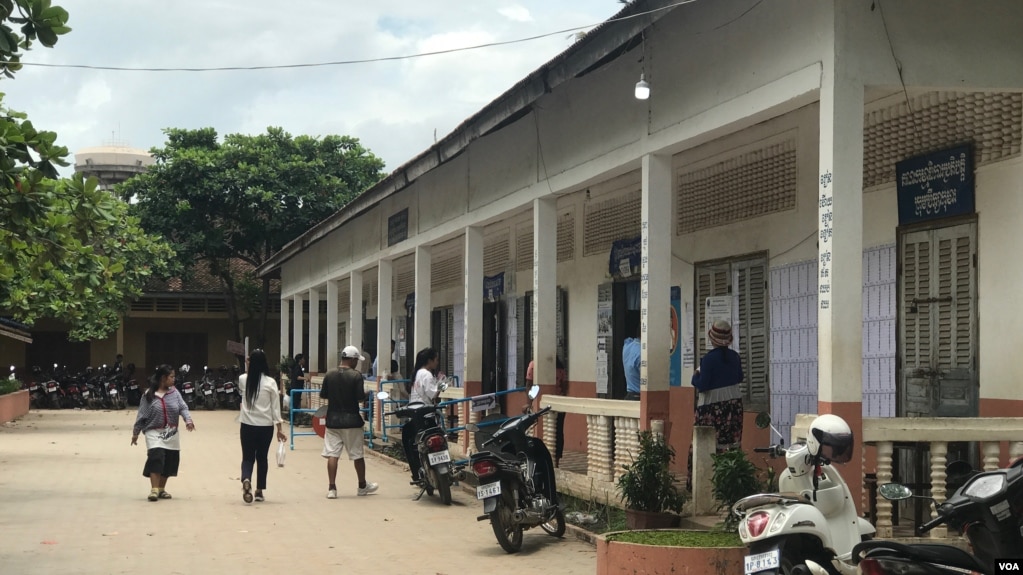
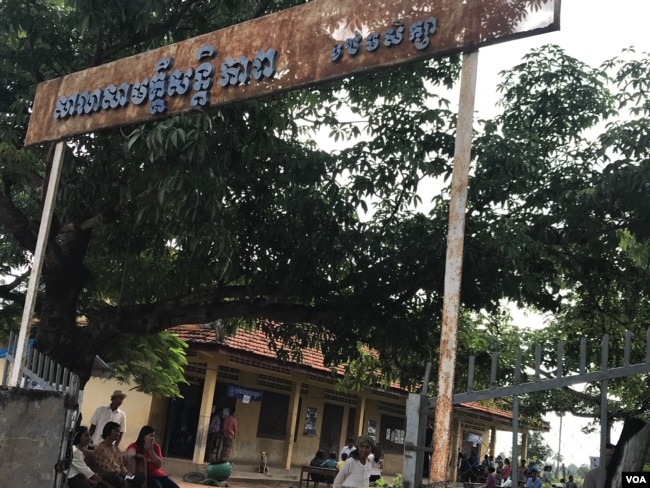

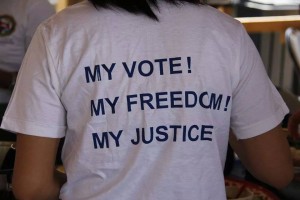
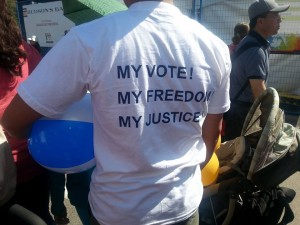
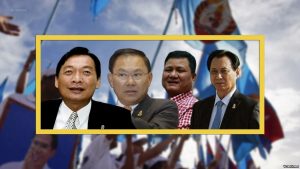
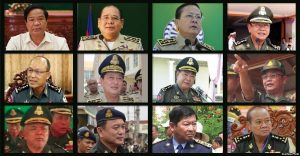
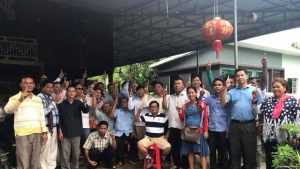
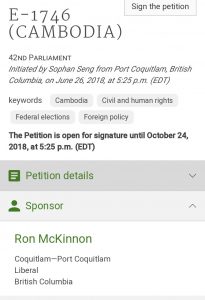
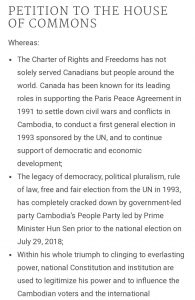
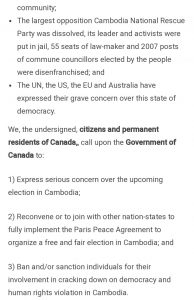
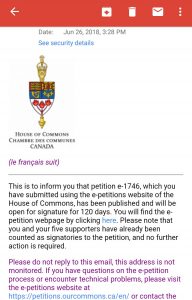
 Two things to be considerate on the recent election in Malaysia: the overseas Malaysians voters and the national institution.
Two things to be considerate on the recent election in Malaysia: the overseas Malaysians voters and the national institution.